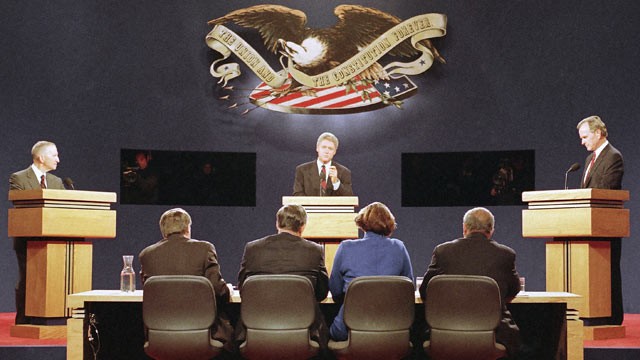A lower-middle-class American ponders the things others might do with his money.
Friday, October 5, 2012
Reason #259: The Debates
Everybody who pays even the slightest bit of attention to presidential politics has heard about at least two significant debates--Lincoln-Douglas in 1858, and Kennedy-Nixon in 1960. The Lincoln-Douglas debates are known for embodying what "real" debates are meant to be--two candidates, unmoderated, addressing and responding to each other directly, speaking sometimes for as long as ninety minutes.
At the other end of the spectrum, the first debate between John F. Kennedy and Richard Nixon was the first ever broadcast on national television, and has gone down in history not for what the candidates said, but for how they looked. Kennedy was tan and well-rested, Nixon a sweaty, unshaven mess. That one evening undoubtedly set the debates on the path they've taken ever since, but it turns out that's even more true than many people realize: prior to Kennedy-Nixon, there were pretty much zero recognizable presidential debates of any kind.
Even the aforementioned Lincoln-Douglas debates were for an Illinois Senate seat; though they two men did end up running against each other for president two years later, no debates took place in the election that year, or at all until well into the next century. Franklin D. Roosevelt notably declined a debate challenge from Republican Wendell Wilkie in 1940, and in 1948 and 1956, there was exactly one Republican and one Democratic primary debate, respectively--each between only two candidates, a stark contrast to the parade of clowns we saw this year.
When Nixon and Kennedy finally ended up before the cameras on September 26, 1960, television news was far younger than even the internet is today; one gets the impression the candidates were motivated less by the debate opportunity itself than by the desire just to get on TV for a while. After their bad showing--literally--at the first debate, Nixon's team learned quickly, and made sure that their candidate was as comfortable and presentable as possible from there on out. They had made a big mistake, all right, but it's safe to say that no one has made it since.
But even after all of that, the 1960 debates spent more than a decade as the exception rather than the new rule--there wouldn't be another of their ilk until 1976, televised or otherwise. '76 was the first time an incumbent president, Gerald Ford, had to meet his challenger on the equal footing a televised debate offers, and as Rachel Maddow thoroughly illustrated on her show last night, it would be the first in a long series of debates where the incumbent, having lived in a bubble of yes-men for four years, would come across as befuddled and indignant in the face of someone aggressively coming after his job.
Third-party candidates have traditionally been excluded from general election debates over the years, to the consternation of many, with two notable exceptions: in 1980, Jimmy Carter refused to debate alongside both Republican challenger Ronald Reagan and Independent challenger John B. Anderson, which resulted in one debate between Reagan and Anderson (who largely agreed with each other) with no Carter, and finally, one debate between Reagan and Carter with no Anderson. Sure enough, Carter didn't make it through the sequence of events looking very good, and Reagan went on to crush him a couple weeks later.
Then in 1992, Independent Ross Perot managed to attract enough support that he was allowed into all three Bush-Clinton debates, and even went on to win almost 19% of the popular vote, which is unimaginable in the modern, post-Nader world of third-party candidates. Perot's candidacy is of special significance to me, in that his near-constant 30-minute political infomercials, paid for with his own money, are my earliest presidential-election memory of any kind--if only because they were always preempting TGIF.
Vice-Presidential debates have traced more or less the same trajectory over the years, with the exception being that they've rarely made much difference in their respective races. By a long shot, the most famous moment in any Vice-Presidential debate came in 1988 (sorry, Sarah Palin), when Dan Quayle, George Bush's running mate, compared his own political experience to that of JFK, and Democrat Lloyd Bentsen replied "Senator, I served with Jack Kennedy. I knew Jack Kennedy. Jack Kennedy was a friend of mine. Senator, you're no Jack Kennedy."
The moment rang true, and Dan Quayle went on to become a bigger joke than Joe Biden could ever dream of being. Nevertheless, people were being asked to vote for George Bush, not Quayle, so he also went on to become Vice President.
Further Reading
The Commission on Presidential Debates - Debate History
Wikipedia - Presidential debates
Wikipedia - United States Presidential Election Debates, 2012
Wikipedia - "Senator, you're no Jack Kennedy"
Labels:
elections,
government,
presidency,
taxes
Subscribe to:
Post Comments (Atom)

No comments:
Post a Comment